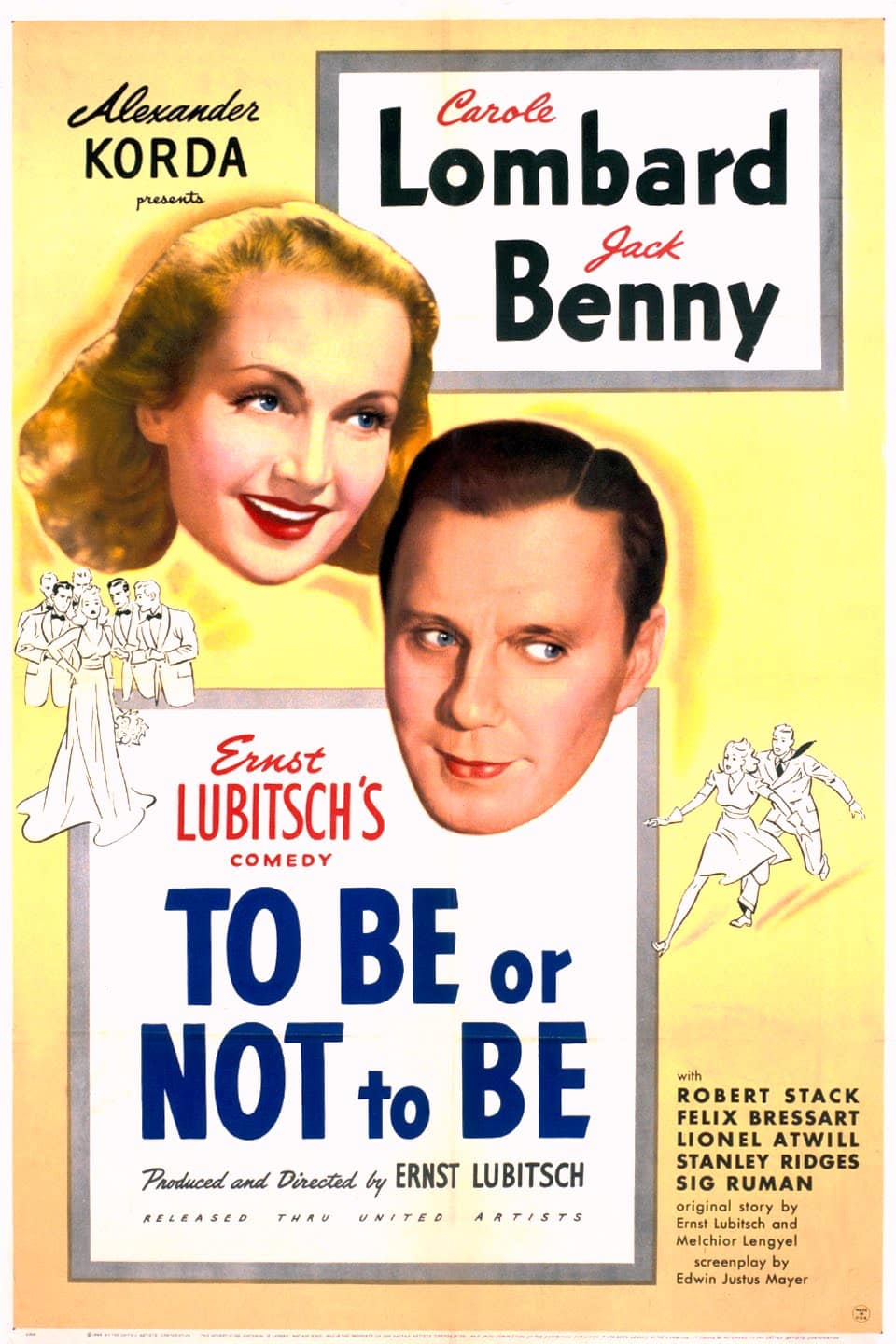
- Starring
- Carole Lombard, Jack Benny, Robert Stack
- Writer
- Edwin Justus Mayer
- Director
- Ernst Lubitsch
- Rating
- PG (Canada, United States)
- Running Time
- 99 minutes
Overall Score
Rating Summary
To Be or Not to Be is about a troupe of actors in Nazi-occupied Warsaw, lead by actor and actress couple Joseph and Maria Tura (Benny and Lombard, respectively) who use their abilities at disguise and acting to fool the occupying troops. In the midst of this mission, they all have to grapple with their respective ambitions; Among others, Stanislov Bronski (Stack) wants to be more than just a spear carrier, while the Jewish Greenberg (Felix Bressart) has always dreamt of playing Shylock in The Merchant of Venice.
Films about actors at their worst can be terribly smug and self-indulgent, but at their best they’re a minefield for great satire, commentary about the film and theater industry, and insight into the actors’ mind and psyche. To Be or Not to Be is also a great satire against the Nazi movement; it makes less of a direct aim at the emotions than something like The Great Dictator, but like that film, it exposes a truth that few people wanted to face with a clear mind in 1942: that the Nazis were not these superhuman machine monsters; they were ordinary human beings being driven to commit inhumane acts of cruelty by a hateful ideology. And they were capable of being vulnerable. On some level, it’s easy to understand why a film like this would be a critical and commercial failure at the time of its release; in early 1942, it seemed scarily possible that Hitler could win, and for a film like this to satirize his movement in the form of a screwball comedy clearly seemed inappropriate and out-of-step. But what makes this work, just like Lubitsch’s other great works, is his understanding of human relationships. His best characters are complicated, troubled, messy, and often make irrational decisions, but they also enjoy being in each other’s company in a way that feels true to the way we tend to enjoy being in other peoples’ company, no matter the way we convey that when we’re around them.
In the opening scene, Lubitsch and Mayer actually dare to humanize Hitler in the slightest. Showing him alone just walking down a street in Warsaw, the scene is accompanied by a humorous voiceover joking about his vegetarian diet, and whether or not he will make an exception for the delicatessen he’s passing by. This reviewer loves that sort these sorts of observations made within a movie because you can interpret it in so many ways, just based on the words being used. In another scene, the director of the anti-Nazi play complains that the Bronski (Tom Dugan), the actor playing Hitler, doesn’t look enough like Hitler, that he “just looks like a man with a mustache”. The crew responds “But so is Hitler!” It’s moments like those that lift spirits higher than something like Mrs. Miniver, that was released the same year.
To Be or Not to Be also shows us up with the reality that highly successful people, even genuinely nice ones, can be full of themselves and annoyingly self-reverential, so utterly convinced of the greatness of their work. They can be insufferable even when the work is legitimately great. The performances certainly back this up as Benny plays Joseph as a consummate ham, the type one could find only in theater, while Lombard is such a great sensual seductress. It is saddening to think of what Lombard could’ve offered audiences had she not passed away so soon in her career, but this is a great sendoff and perhaps her greatest performance. The actors around them chip in great work as well, from the aforementioned Stack and Bressart, Sig Ruman as Colonel Ehrhardt.
Mayer deserves a lot of credit for writing such a concise, quick-witted script, full of knowing, clever references and understanding of all its topics. The dialogue is often rib-crackingly hilarious, and it’s easy to see how the film influenced later films like Inglourious Basterds, another film that uses the essence of cinema to take down the Nazis within its setting. The sets and costumes immerse us into the theater world without ever coming off as cheap, while every other aspect of the production is on-point.
Above all else, To Be or Not to Be is a reminder of how well comedy can be used in the face of adversity and real-life crises.
still courtesy of Criterion
Follow me on Twitter, Instagram, and Letterboxd.
If you liked this, please read our other reviews here and don’t forget to follow us on Twitter or Instagram or like us on Facebook.
Discover more from
Subscribe to get the latest posts sent to your email.

